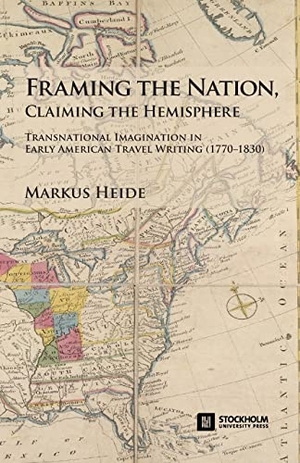Für statistische Zwecke und um bestmögliche Funktionalität zu bieten, speichert diese Website Cookies auf Ihrem Gerät. Das Speichern von Cookies kann in den Browser-Einstellungen deaktiviert werden. Wenn Sie die Website weiter nutzen, stimmen Sie der Verwendung von Cookies zu.
Cookie akzeptieren
Markus Heide
Framing the Nation, Claiming the Hemisphere
- Stockholm University Press
- 2022
- Taschenbuch
- 322 Seiten
- ISBN 9789176351956
Travel reports have shaped the emergence of early U.S. culture and its "geographical imagination" (David Harvey). Framing the Nation, Claiming the Hemisphere examines the trans-national imagination in travel reports by American authors written between 1770 and 1830. Its range is from John and William Bartram's pre-revolutionary travelogues and Jonathan Carver's exploratory report on his journey in the Great Lakes region (1778), to Olaudah Equiano's The Interesting Narrative (1789), to early nineteenth-century reports, such as Anne Newport Royall's Sketches of History, Life, and Manners, in the United States (1826) and William Duane's A Visit to Colombia (1826). The chapters of the monograph concentrate on writing about journeys to the North American 'interior', the Caribbean, Latin America, and Africa. The primary sources were written between the beginning of the struggle against British rule, following the end of the French and Indian War, and the beginning of Andrew Jackson's presidency. The decades between 1770 and 1830 were times of shifting colonial boundaries, nation-building, and emergent discourses of collective identification in North America. The study reads travel writing in the context of the identity-generating
Mehr
Weniger
zzgl. Versand
in Kürze